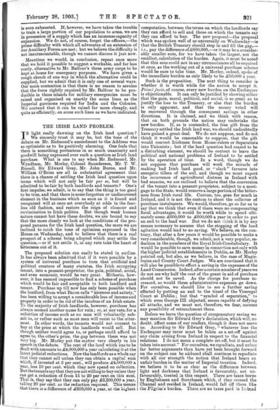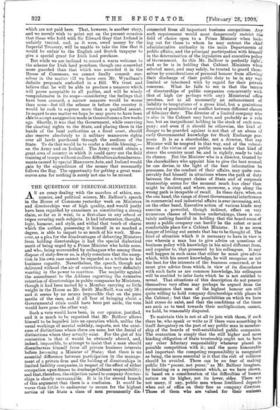THE IRISH LAND PROBLEM.
IS light really dawning on the Irish land question ? We sincerely trust it may be, but the tone of the debate on Mr. Redmond's amendment to the Address was so optimistic as to be positively alarming. One feels that there is something portentous in so much unanimity and goodwill being expressed over such a question as Irish land purchase. What is one to say when Mr. Redmond, Mr. Wyndham, Mr. Morley, Colonel Saunderson, Mr. T. W. Russell, Sir Edward Grey, Mr. John Burns, and Mr. William O'Brien are all in substantial agreement that there is a chance of settling the Irish land question upon terms which will not only be fair per se, but will be admitted to be fair by both landlords and tenants ? One's first impulse, we admit, is to say that the thing is too good to be true, and that there is some forgotten or undiscovered element in the business which as soon as it is found and recognised will at once set everybody at odds in the fear- less old fashion, and restore the reign of clamour and recrimination to Irish politics. But though weak human nature cannot but have these doubts, we are bound to say that the more closely we look at the conditions of the pro- posed panacea for the Irish land question, the more we are inclined to catch the tone of optimism expressed in the House on Wednesday, and to believe that there is a real prospect of a scheme being adopted which may settle the question,—or if not settle it, at any rate take the heart of bitterness out of it.
The proposed solution can easily be stated in outline. It has always been admitted that if it were possible by a system of universal purchase to turn that artificial and political creature of many statutes, the Irish occupying tenant, into a peasant-proprietor, the gain, political, social, and even economic, would be very great. Hitherto, how- ever, it has seemed impossible to find a scheme of purchase which would be fair and acceptable to both landlord and tenant. Purchase up till now has only been possible when the landlord, from what Bacon calls "niceness and satiety," has been willing to accept a considerable loss of income and property in order to be rid of the incubus of an Irish estate. To the majority of Irish landlords, however, purchase has always seemed another name for ruin; or, at any rate, for a reduction of income such as no man will voluntarily, sub- mit to, or rather such as most men will resist to the utter- most. In other words, the tenants would not consent to buy at the price at which the landlords would sell.. But though neither would agree to, or perhaps could afford to agree to, the other's price, the gap between them was not very big. Mr. Morley put the matter very clearly in his speech in the debate. The rent of the land which has to be dealt with amounts to £4,000,000 a year calculating it at the latest judicial reductions. Now the landlords as a whole say that they cannot sell unless they can obtain a capital sum which, if invested at 3 per cent., will produce £4,000,000 a year, less 10 per cent. which they now spend on collection. But the tenants say that they are not will ing to buy unless they can get a reduction of from 15 to 20 per cent on this sum. i That is, they say that they can only pay £3,200,000 a year, taking 20 per cent. as the reduction required. This means that there is a difference of £800,000 a year, at the highest computation, between the terms on which the landlords say they can afford to sell and those on which the tenants say they can afford to buy. The new proposal—the proposal which was spoken well of so universally on Wednesday—is that the British Treasury should step in and fill the gap,- i.e., pay the difference of.2800,000,—or it may be a consider- ably smaller sum, for we have taken the largest, not the smallest, calculation of the burden. Again, it must be noted that this sum could not in any circumstances all be required at once, as the working out of a universal purcha,se scheme would be sure to take time. Mr. Morley, indeed, spoke of the immediate burden as only likely to be £50,000 a year.
Such is the proposition. The next thing to consider is whether it is worth while for the nation to accept it. Primed, facie, of course, every new burden on the Exchequer is objectionable. It can only be justified by showing either that the gain, moral, political, and social, is so great as to justify the loss to the Treasury, or else that the burden is only apparent, and that the money voted will be recovered through the consequent savings in other directions. It is claimed, and we think with reason, that on both grounds the nation may undertake the new burden. If, as is contended, the free gift from the Treasury settled the Irish land war, we should undoubtedly have gained a great deal. We do not suppose, and do not think it would be reasonable to suppose, that the gift would convert Irishmen from Home-rulers or Separatists into Unionists ; but if the land question had ceased to be a disturbing element, we should be content to leave the political and national problems of Ireland to be settled by the operation of time. In a word, though we do not suppose that purchase will work the miracle of making bad Irish land good, or " slack " farmers into energetic tillers of the soil, and though we must expect the recurrence of agricultural distress in Ireland with bad seasons, we are inclined to believe that the conversion of the tenant into' a peasant-proprietor, subject to a mort- gage to the State, would remove a large portion of the bitter- ness from Irish rural life. Custom, too, goes for much in Ireland, and it is not the custom to shoot the collector of purchase instalments. We would, therefore, go so far as to say that we think that even if there were no compensating fiscal advantages, it would be worth while to spend ulti- mately some £600,000 to £800,000 a year in order to put an end to the land war. But we do not think it is by any means necessary to assume that the stopping of the land agitation would lead. to no saving. We believe, on the con- trary, that after a few years it would be possible to make a very considerable, though, we admit, not a very popular, re- duction in the numbers of the Royal Irish Constabulary. It would be possible to save money in connection not only with the higher judicial establishments in Dublin, as Mr. Morley pointed out, but also, as we believe, in the case of Magis- trates and County Court Judges. We are convinced that it will also be possible to effect a saving in the expenses of the Land Commission. Indeed, after a certain number of years we do not see why half the cost of the grant in aid of purchase should not be saved. As the charge for purchase in- creased, so would these administrative expenses go down. For ourselves, we should like to see a further saving effected by putting an end to the tinsel of the Viceregal Court at Dublin ; but that " symbol of separation," to which even George III. objected, seems capable of defying all attacks, and we must not, therefore, we fear, assume any possibility of retrenchment there.
Before we leave the question of compensatory saving we may mention Sir Edward Grey's declaration, which will, no doubt, affect some of our readers, though it does not move us. 'According to Sir Edward Grey, " whatever loss' the Exchequer may incur must be taken as a set-off against any claim arising from Ireland in respect to the financial relations. I do not mean a complete set-off, but it must be taken into account." For ourselves, we repudiate, and unless far better arguments than have yet been brought forward on the subject can be adduced shall continue to repudiate with all our strength the notion that Ireland bears an unfair burden in the matter of Imperial taxation. Indeed, we believe it to be as clear as the difference between light and darkness that Ireland is favourably, not un- favourably, treated in this respect. There are taxes borne by Englishmen and Scotchmen which, if they crossed the 'Channel and resided in Ireland, would fall off them like the Pilgrim's burden. There are no taxes paid in Ireltud which are not paid here. That, however, is another story, and we merely wish to point out on the present occasion that those who hold with Sir Edward Grey that Ireland is unfairly treated, and, as it were, owed money by the Imperial Treasury, will be unable to take the line that it would be unfair to the English and Scotch taxpayer to give a special grant for Irish land purchase.
But while we are inclined to accord a warm welcome to the scheme for Irish land purchase, though one somewhat more guarded than that whiCh was accorded it in the House of Commons, we cannot finally commit our- selves in the matter till we have seen Mr. Wyndham's definite proposals embodied in a Bill. We trust and believe that he will be able to produce a measure which will prove acceptable to all parties, and will be wisely comprehensive in its scope—considering the feelings that have been aroused, a narrow measure would be worse than none—but till the scheme is before the country it would be rash to express more than a qualified assent. In regard to one matter we hope he may prove to have been able to accept a suggestion made in thesecolumns a few weeks ago. Shortly, it was that the Government, while reserving the shooting rights to the State, and placing them in the hands of the local authorities as a fiscal asset, should also reserve absolutely to it military manoeuvre rights over all lands purchased through the medium of the State. To do that would be to confer a double blessing,— on the Army and on Ireland. The Army would obtain a great area of country in which it could carry out the field training of troops without endless difficultiesandembarmss- meats caused by special Manoeuvre Acts, and Ireland would gain by the expenditure of the money that necessarily follows the flag. The opportunity for getting a great man- 0311V113 area for nothing is surely not one to be missed.











































 Previous page
Previous page